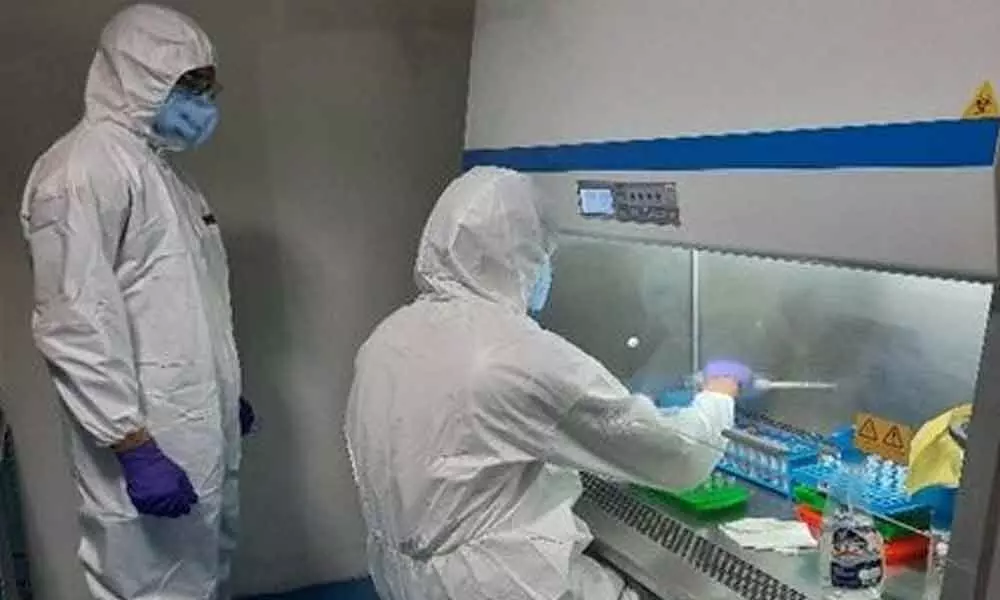Hyderabad: CDFD finds four unique mutations in Covid-19 strain in Telangana State

Volunteers wearing PPE performing virus inactivation from patient samplesin the BSL2 lab facility in CDFD
- The scientists also observed predominance of D614G spike protein mutation in more than 95 per cent samples
- This mutation has been associated with higher infection rates of the virus
Hyderabad: Four unique and relatively high frequency mutations have been found in coronavirus strain circulating predominantly in Telangana by the scientists of the Hyderabad-based Centre for DNA Fingerprinting and Diagnostics (CDFD).
The CDFD has undertaken a comprehensive SARS-CoV-2 genomic study from Telangana. The Genomic sequencing of 210 viral isolates obtained from Hyderabad and surrounding districts has revealed that the Wuhan strain has been virtually replaced by another strain, which probably came from Europe. Called as '20B' lineage or the G/GR clade, it was associated with 95 per cent of the samples, according to CDFD Director, Dr K Thangaraj.
The scientists also observed a very high predominance of D614G spike protein mutation in more than 95 per cent samples. This mutation has been associated with higher infection rates of the virus. Also, several unique, low-frequency gene mutations (not reported earlier) were identified affecting specific viral proteins involved in viral propagation.
Since April, the CDFD has received 26,000 samples from across Telangana and 7,000(around 26 percent) of them tested positive. Although the samples of the males were more than the females, the infection rates were almost similar—it was 25.5 per cent among males and 26.5 per cent among females.
The highest infection rate was found in patients of 15-40 years of age group. More than 50 percent of the 14,000 samples in this group were positive. Around 32.8 percent of the samples (1679) in COVID-19 patients aged 60 years and above were found to be positive, while the infection rate in patients of 40-60 years' age group was 28.2 percent.
While it is not yet known whether the high-frequency mutations were in any way contributing to reducing the virulence of the virus and low mortality in India, Dr Thangaraj said that scientific evidence in the past has shown that mutations in the immunologically relevant genes in Malaria and Leishmaniasis patients are significantly different when compared to normal individuals suggesting that some individuals / populations acquired mutations that give resistance against both diseases.
Besides, people in India are generally exposed to a wide variety of pathogens as compared to the populations in developed countries. That might have also contributed to a better immune response to infections with our genome adapting to live against certain micro-organisms, he added.
Pointing out that genomic variation plays a critical role in the progression of infectious diseases and mortality, Dr Thangaraj cited the example of ancestral tribes living in forests.
He said they developed certain mutations which gave them resistance against malaria infection.
He said the high frequency mutations found in the Coronavirus strain have to be carefully looked into while developing vaccines and drugs.
Dr Thangaraj said genomic analysis was important to study the function of altered (mutant) proteins and their effect in protein-protein and protein-RNA interactions in viral propagation within the host as also viral adaptation to evade host immune response. He said CDFD was analyzing around 300 samples from COVID-19 infected patients per day.
The CDFD Covid-19 Diagnostics is spearheaded by Dr Ashwin Dalal, Dr Rashmi Bhandari, Dr Murali Dharan Bashyam and Dr R Harinarayanan.















